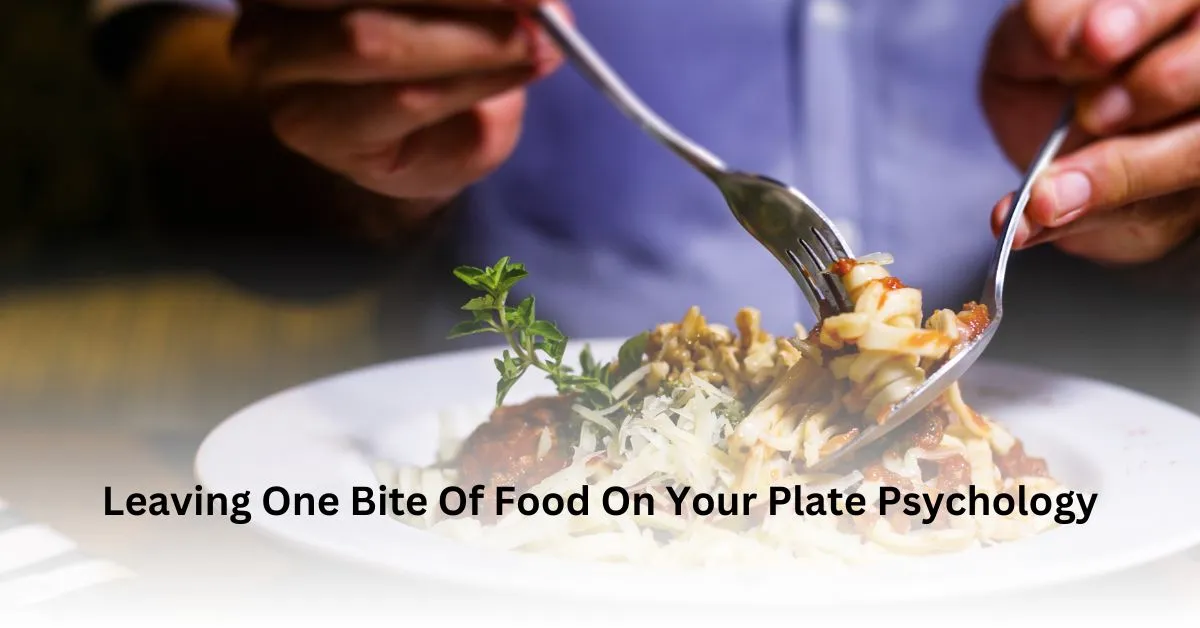Have you ever paused to contemplate the intricate psychology behind the seemingly simple act of leaving one bite of food on your plate? Whether influenced by cultural norms or personal habits, the decision to leave that final morsel uneaten unveils profound insights into our relationship with food. Throughout this article, we embark on a journey to explore the multifaceted dimensions of “leaving one bite of food on your plate psychology.” From ingrained evolutionary instincts to the pervasive impact of societal influences, we dissect the complexities that make it a challenging task to resist that last mouthful.
Moreover, we delve into strategies aimed at occasionally leaving that one bite behind, highlighting the potential benefits it can yield in promoting mindful consumption and fostering a more balanced approach to eating. Additionally, we shine a spotlight on the intriguing concept of “last bite syndrome,” uncovering its psychological underpinnings and implications. By the culmination of this exploration, readers will not only gain deeper insights into their own eating behaviors but also glean valuable lessons on how mindful consumption can enrich their dining experiences. Join us as we unravel the mysteries behind leaving one bite of food on your plate and unlock its profound psychological implications.
Why Is It Difficult to Leave a Bite of Food Behind?
Psychological factors
a. Evolutionary instincts: Throughout human history, the psychology behind leaving one bite of food on your plate has been influenced by evolutionary instincts. The drive to consume as much food as possible when available was crucial for survival, making it challenging to resist even a single bite left behind.
b. Cultural influences: Cultural norms play a significant role in shaping our behavior around food consumption, including the act of leaving one bite on the plate. In many cultures, leaving food uneaten is viewed negatively, reinforcing the inclination to finish every last morsel.
c. Personal upbringing and experiences: Our individual experiences, particularly during childhood and beyond, contribute to the psychology of leaving one bite of food on your plate. Whether it’s being taught to clean our plates or experiencing scarcity, these factors shape our habits and attitudes toward food, influencing the decision-making process when faced with the prospect of leaving one bite behind.
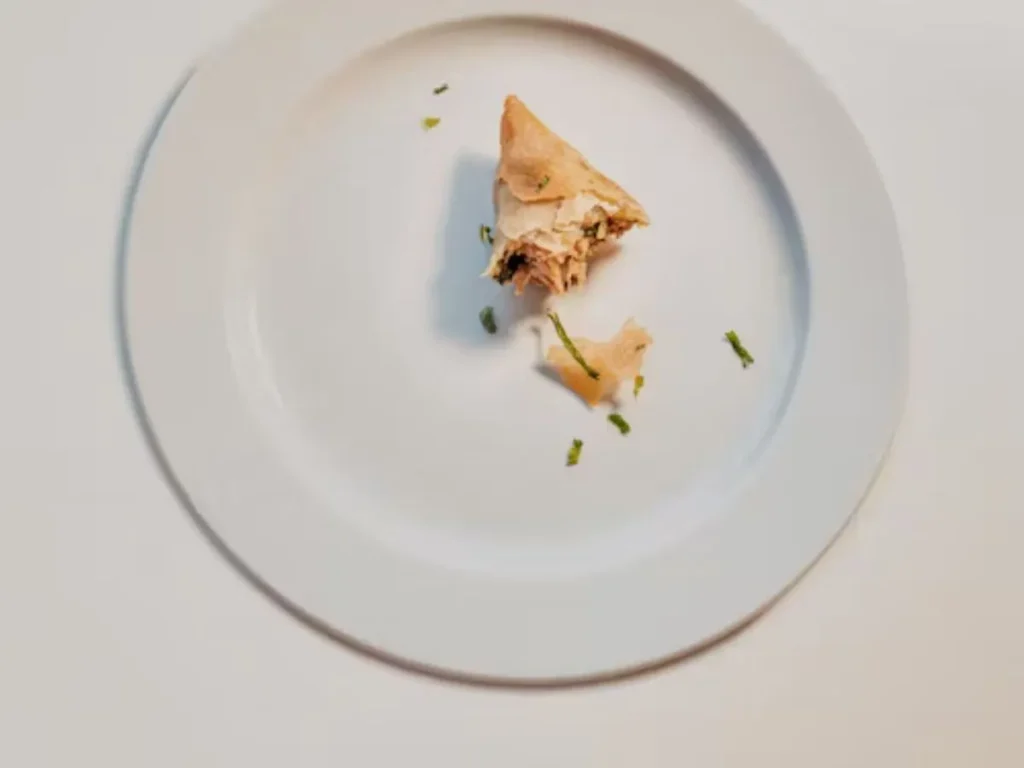
The role of portion size and visual cues:
The role of portion size and visual cues plays a pivotal role in the complex psychology behind leaving one bite of food on your plate. With the advent of modern dining practices, food portions have undergone a significant increase, reshaping our perception of what constitutes a reasonable serving. As a result, individuals may find it challenging to gauge their level of satiety accurately, leading to a tendency to overconsume.
Moreover, visual cues, such as an almost-empty plate, can subconsciously influence our eating behavior, compelling us to finish everything before acknowledging our fullness. These visual cues serve as powerful triggers, compelling us to disregard our body’s signals and succumb to the societal pressure of cleaning our plates. In essence, the manipulation of portion sizes and visual stimuli underscores the intricate dynamics of leaving one bite of food on your plate psychology, highlighting the profound influence of environmental factors on our eating behaviors.
Emotional attachment to food:
Emotional attachment to food further complicates the act of leaving one bite behind on your plate. Our relationship with food extends beyond mere sustenance, often intertwining with our deepest emotions and memories. Food serves as a conduit for comfort, joy, and nostalgia, eliciting powerful emotional responses that transcend its nutritional value. Consequently, the decision to leave one bite uneaten may evoke feelings of guilt, loss, or deprivation, as individuals grapple with the emotional significance attached to the act of consumption.
This emotional attachment reinforces the psychology behind leaving one bite of food on your plate, as it symbolizes more than just abandoning a meal—it represents relinquishing a cherished experience or comfort source. The intricate interplay of emotions further underscores the complexities of leaving one bite of food on your plate psychology, emphasizing the profound emotional resonance inherent in our dietary choices.
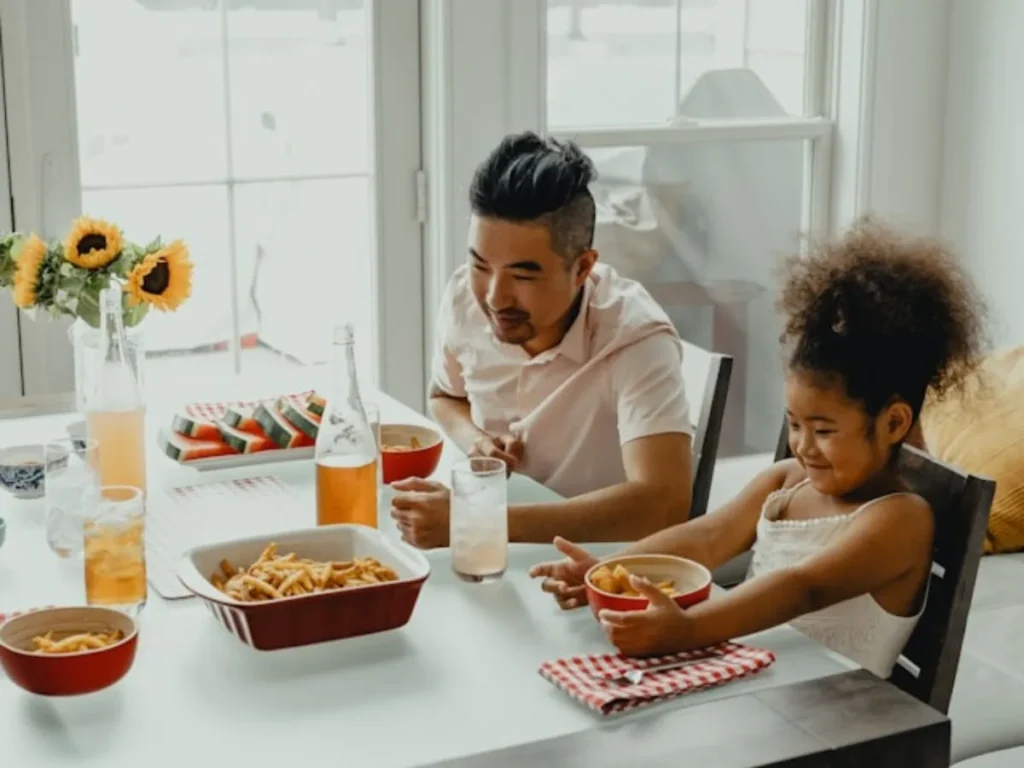
How to Sometimes Leave Out One Bite of Food?
- Mindful eating techniques: Incorporating mindful eating practices can help individuals become more aware of their body’s hunger and satiety cues, making it easier to leave one bite of food behind on the plate. Mindful eating involves paying full attention to the sensory experience of eating, including the taste, texture, and aroma of food, without judgment or distraction. By focusing on the present moment during meals, individuals can better gauge their level of fullness and stop eating before finishing every last bite, thereby understanding the leaving one bite of food on your plate psychology.
- Setting intentions before meals: Before sitting down to eat, individuals can benefit from setting intentions regarding their eating behaviors. This can involve establishing goals such as practicing portion control, listening to internal hunger cues, or consciously leaving one bite of food on the plate at the end of the meal. By setting intentions beforehand, individuals can mentally prepare themselves to make mindful choices during the meal and increase their likelihood of successfully leaving one bite behind, thus addressing the leaving one bite of food on your plate psychology.
- Practicing moderation and self-control: Developing a habit of moderation and self-control is essential for occasionally leaving one bite of food behind on the plate. This involves learning to resist the urge to overeat and stopping eating when feeling comfortably satisfied, rather than waiting until feeling overly full. By practicing moderation, individuals can enjoy their meals without feeling compelled to clean their plates completely. Additionally, exercising self-control involves making conscious decisions about portion sizes and resisting external pressures to finish all the food served, allowing individuals to leave one bite behind when appropriate, thereby understanding and addressing the leaving one bite of food on your plate psychology.
Why you should leave one bite of food on your plate?
Health implications
a. Preventing overeating: By consciously leaving one bite of food on your plate, individuals can avoid the tendency to overeat, which can lead to various health issues such as weight gain, digestive discomfort, and metabolic imbalances. This practice promotes better portion control and helps maintain a healthy balance between calorie intake and energy expenditure.
b. Promoting mindful consumption: Leaving one bite of food behind encourages mindful consumption, where individuals become more attuned to their body’s hunger and satiety signals. By paying attention to how they feel during and after meals, individuals can make more informed choices about their food intake, leading to a more balanced and satisfying eating experience. This aspect of leaving one bite of food on your plate psychology underscores the importance of being present and attentive while eating.
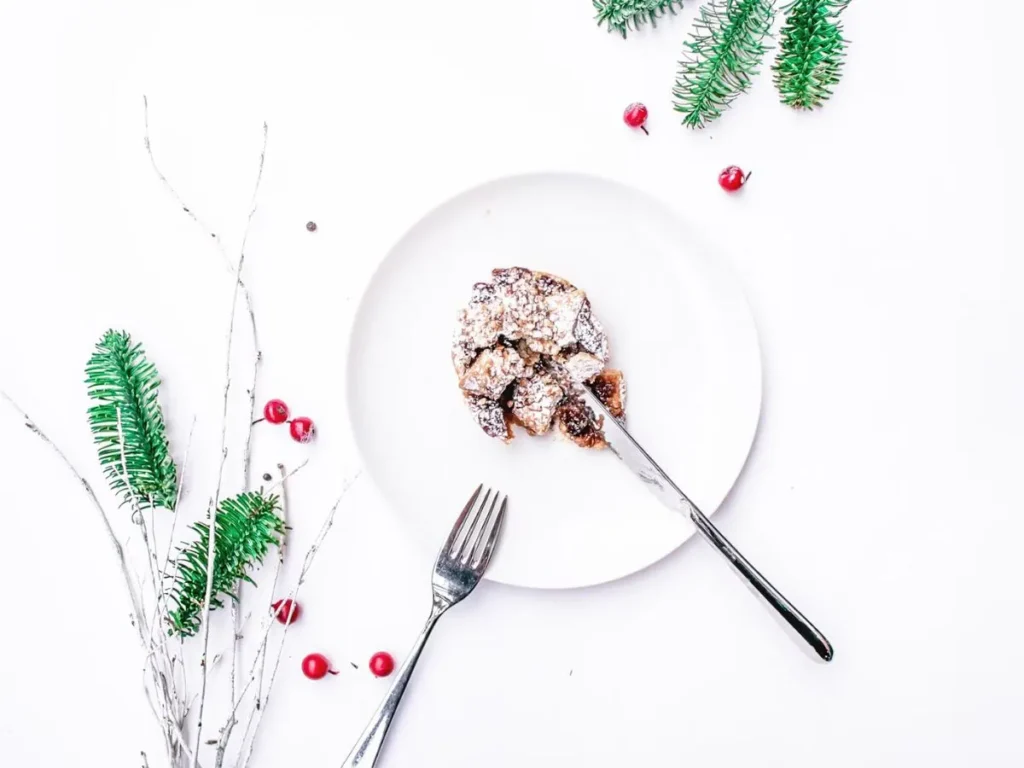
Psychological benefits
a. Feeling empowered and in control: Leaving one bite of food on the plate can foster a sense of empowerment and control over one’s eating habits. It allows individuals to assert their autonomy and make conscious decisions about their food intake, rather than succumbing to external pressures or unconscious eating behaviors. This sense of control can contribute to overall well-being and self-esteem, enhancing the leaving one bite of food on your plate psychology.
b. Breaking habits of food-related guilt: For many individuals, finishing every last bite of food on the plate is associated with feelings of guilt or shame, especially if they perceive it as overindulgence or lack of self-control. By intentionally leaving one bite behind, individuals can challenge these negative associations and develop a healthier relationship with food. This practice promotes self-compassion and reduces the emotional burden often associated with eating, highlighting the transformative impact of the leaving one bite of food on your plate psychology.
Important Links
- Cabinets for Garage
- Living Room Painting Ideas
- 7 Innovative Ideas for Roof Garden
- Rock Sculptures for the Garden
- Best Equipment for Leveling Ground
- How to Install Metal Baluster
Leaving one bite of food on your plate psychology
Overcoming the fear of wasting food: One of the biggest obstacles to leaving one bite of food behind on the plate is the fear of wasting food. Many individuals have been taught from a young age to finish everything on their plate to avoid wasting food, instilling a sense of guilt or obligation to consume every last bite.
However, overcoming this fear involves reframing the mindset around food waste. Rather than viewing leaving one bite behind as wasteful, it can be seen as a conscious decision to prioritize listening to one’s body and practicing moderation. By recognizing that it’s okay to leave a small portion uneaten, individuals can gradually overcome the fear of wasting food and develop a healthier attitude towards consumption, contributing to the leaving one bite of food on your plate psychology.
Embracing the concept of “good enough”: The concept of “good enough” emphasizes finding satisfaction in adequacy rather than perfection. When it comes to eating, striving for perfection by finishing every last bite on the plate can lead to overeating and dissatisfaction. Instead, individuals can embrace the idea that it’s enough to eat until they’re comfortably satisfied, even if it means leaving one bite behind. By letting go of the need to consume every morsel of food, individuals can experience a greater sense of contentment and fulfillment in their eating habits, reflecting the leaving one bite of food on your plate psychology.
Building a healthier relationship with food: Leaving one bite behind on the plate is not just about physical nourishment—it’s also about fostering a healthier relationship with food. By practicing moderation and listening to their body’s hunger and fullness cues, individuals can develop a more mindful and intuitive approach to eating. This involves tuning into internal signals rather than external influences, such as portion sizes or societal expectations. By building a healthier relationship with food based on self-awareness and self-care, individuals can cultivate a positive eating environment that promotes overall well-being and satisfaction, embodying the leaving one bite of food on your plate psychology.
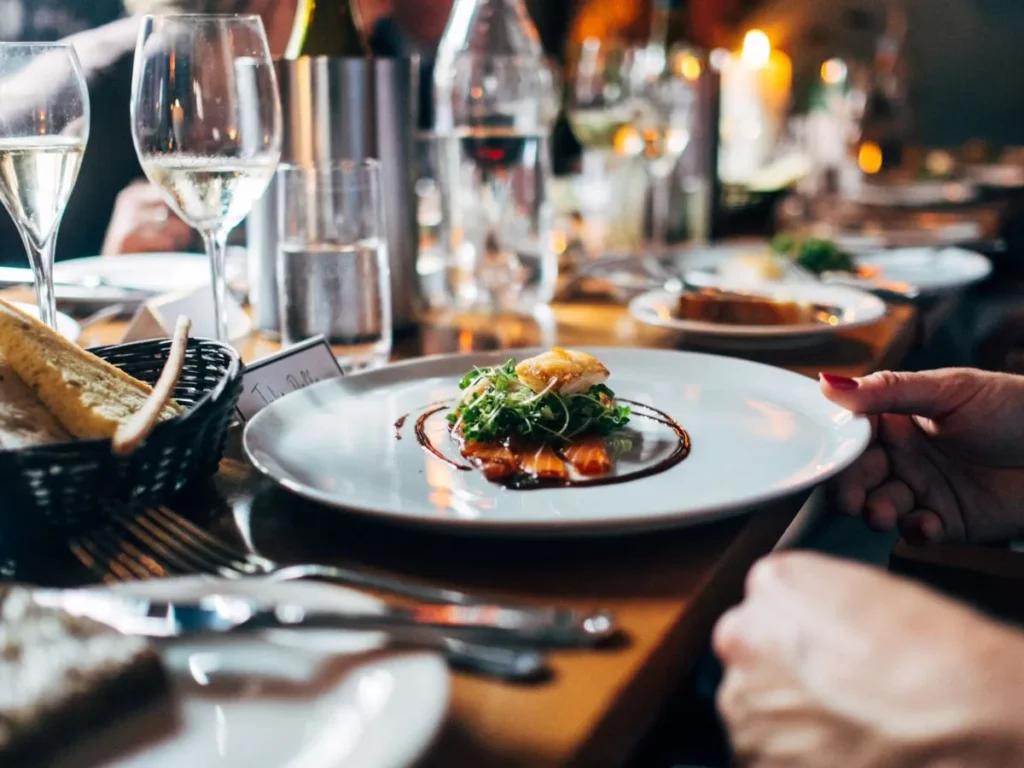
What Is Last Bite Syndrome?
Last Bite Syndrome refers to the tendency some individuals have to save the best or most satisfying portion of a meal for the final bite. This phenomenon is characterized by a desire to end the meal on a high note, often by consuming the most flavorful or enjoyable part of the dish as the last bite. Last Bite Syndrome can manifest in various ways, such as saving a piece of dessert or the tastiest portion of the main course until the end of the meal.
Last Bite Syndrome can be attributed to several psychological factors. One explanation is rooted in the concept of delayed gratification, where individuals derive greater pleasure from postponing the consumption of highly rewarding stimuli. Saving the best bite for last allows individuals to prolong the enjoyment of the meal and savor the anticipation of the final taste. Additionally, Last Bite Syndrome may also stem from a desire for closure or completion, as individuals seek to end the meal on a satisfying note and avoid feelings of regret or dissatisfaction.
Strategies for overcoming last bite syndrome:
- Practice mindful eating:
- Pay attention to each bite of food as you consume it.
- Focus on the flavors, textures, and sensations experienced throughout the meal.
- Avoid fixating on saving the best portion for last and instead appreciate the entire dining experience.
- Redistribute enjoyment:
- Alternate between different flavors and textures throughout the meal.
- Mix and match bites to ensure that each part of the meal is equally satisfying.
- By spreading enjoyment across the entire meal, you can diminish the urge to save the best for last.
- Portion control techniques:
- Divide your meal into smaller servings to avoid feeling overwhelmed by the desire to save a specific bite for the end.
- Share dishes with dining companions to distribute the enjoyment and prevent the fixation on a single bite.
- By moderating portion sizes, you can reduce the temptation to save the most satisfying portion for the final bite.
- Set intentions before the meal:
- Prior to eating, establish goals to focus on the present moment and enjoy each bite as it comes.
- Remind yourself that every part of the meal contributes to the overall dining experience, rather than fixating on the last bite.
- By setting intentions to overcome Last Bite Syndrome, you can cultivate a more balanced and mindful approach to eating.
- Experiment with meal sequencing:
- Vary the order in which you consume different components of the meal.
- Start with the most satisfying portions first to prevent the urge to save them for the end.
- By mixing up the sequence of dishes, you can disrupt the pattern of saving the best for last and enjoy a more diverse dining experience.
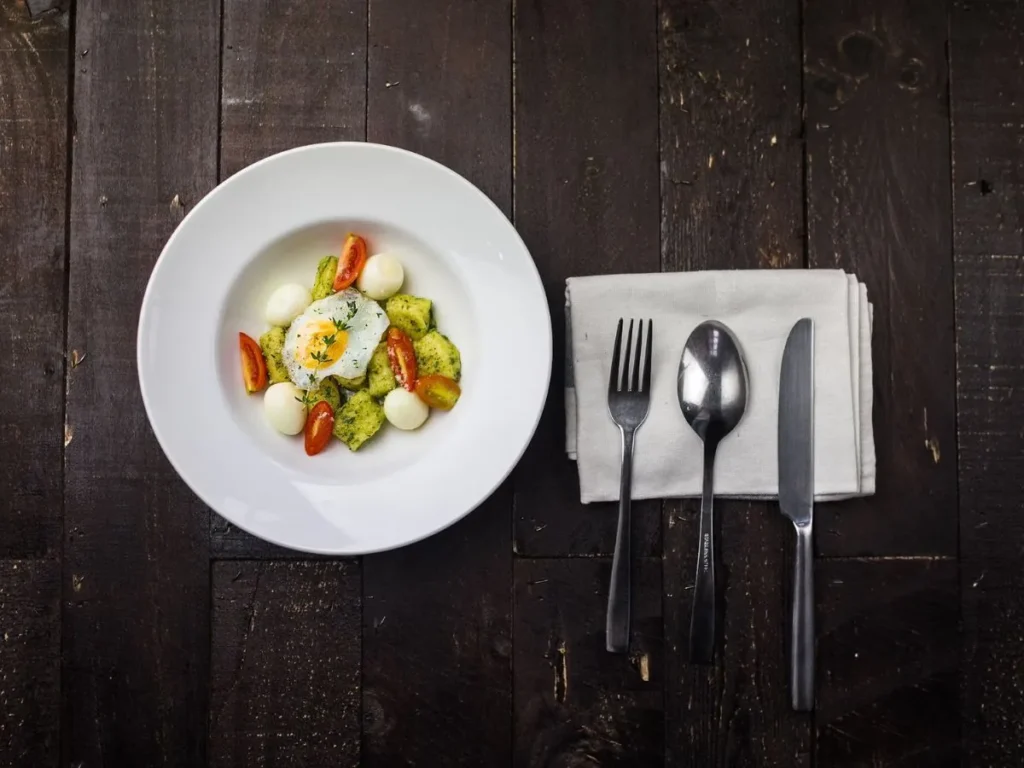
What is the last bite of food called?
The last bite of food, often regarded as a mere formality, transcends its culinary purpose to embody a profound tapestry of cultural nuances and symbolic meanings. Across the globe, diverse cultures have woven unique terminologies and customs around this final morsel, reflecting deep-rooted perspectives on dining rituals and culinary traditions. While some cultures may lack a specific term for the last bite, others elevate it to a ceremonial status, with elaborate expressions and rituals associated with its consumption. This exploration of terminology across cultures offers a glimpse into the intricate interplay between food, culture, and psychology, providing valuable insights into the leaving one bite of food on your plate psychology.
Moreover, the last bite of food carries symbolic weight beyond its function of providing sustenance. It serves as a poignant marker of completion and satisfaction in many cultures, symbolizing the culmination of a shared culinary experience. Yet, it also evokes a sense of anticipation and longing, as individuals relish the final taste before bidding farewell to the meal. Furthermore, the decision to leave one bite uneaten can hold profound symbolism, reflecting values of restraint, self-discipline, or even spiritual beliefs.
Delving into the symbolism and significance of the last bite offers a glimpse into the rich tapestry of cultural, psychological, and emotional dimensions of dining rituals, shedding light on the intricate dynamics of leaving one bite of food on your plate psychology.
Also Read: Safety In The Kitchen For Students
Conclusion
In conclusion, the psychology behind leaving one bite of food on your plate reveals intricate connections between culture, personal experiences, and our relationship with food. By understanding the reasons behind this phenomenon and exploring strategies to overcome it, individuals can cultivate a healthier approach to eating. Embracing mindful consumption and occasionally leaving one bite behind empowers us to listen to our bodies, practice moderation, and find satisfaction in the present moment. Let us embark on a journey of self-discovery, exploring our own attitudes toward food and embracing the simple yet profound act of leaving one bite behind as we strive for balance and well-being.
